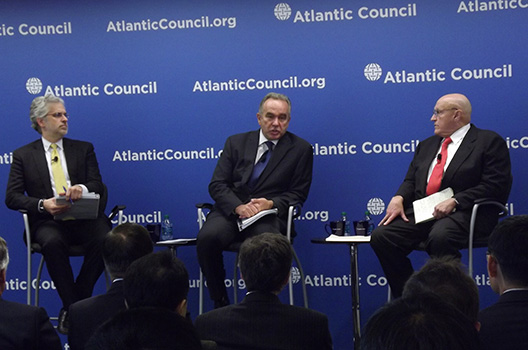 On October 6, 2014, the Brent Scowcroft Center on International Security hosted Secretary Richard Armitage and Dr. Kurt Campbell for the “Future of US Extended Deterrence in East Asia” discussion with an introduction by Chairman Jon Huntsman and moderated by the Scowcroft Center’s director Barry Pavel.
On October 6, 2014, the Brent Scowcroft Center on International Security hosted Secretary Richard Armitage and Dr. Kurt Campbell for the “Future of US Extended Deterrence in East Asia” discussion with an introduction by Chairman Jon Huntsman and moderated by the Scowcroft Center’s director Barry Pavel.
This event is a public release of a brief Chairmen’s statement co-written by Secretary Armitage and Dr. Campbell, as well as an Atlantic Council report produced by Mr. Robert A. Manning, senior fellow at the Brent Scowcroft Center on International Security. The Chairmen described the implications of the evolving strategic situation in East Asia, analyzed the perspectives of key East Asian actors on how ongoing development affect the credibility of US extended deterrence in the region, and offered recommendations on how the United States and its allies can enhance strategic stability in the region.
The main focus of the discussion was on the shift in US foreign policy towards East Asia. This shift in focus, Armitage and Campbell believe, needs to address potential threats to US security and an increase in diplomatic efforts with US allies and China. The US has had a long presence in Asia through its military involvements, which has given a foothold for the US to extend its diplomacy and economy going forward.
The recommendations that were discussed include:
- Clarity in US strategic doctrine and nuclear declaratory policy
- Enhanced strategic dialogues with allies and friends in Asia
- An updated US-Japan alliance
- Comprehensive strategic stability in engagements with China
- US conventional force shifts to Asia, as articulated by senior officials
- Investments in key new technologies and capabilities
- Support for essential economic and energy aspects of US engagement and deterrence
Both speakers also agreed that US leadership and communications between the US and China need to improve. To do this, the US must have a concrete strategy moving forward and need to be honest with their goals and differences with China. China, under the leadership of Xi Jinping, is changing fundamentally, as China is increasing its foreign influence in Asia. President Xi’s consolidation of advisors to be closer to him has made it difficult for the US government to get an understanding of the administration and where the government is heading. This has attributed to high levels of distrust in both the US and Chinese government, which has raised concerns in the area.
Another way to ensure this foreign policy shift is for the US government to sell the increased interest in Asia to the American people. By building support for a stronger US involvement in Asia amongst the population, it will be easier for the government to be more proactive in their plans.
